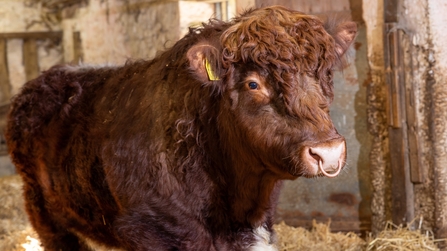Casanova, a magnificent red Luing bull, has arrived to give songbirds a boost at the Rothbury Estate in the Simonside Hills. The bull’s arrival signals a new era for the 3,800 hectare estate as new owners, The Wildlife Trusts and Northumberland Wildlife Trust, look at ways to enhance and protect nature as spring begins.
Casanova to bring Simonside Hills alive with the sound of music!

Casanova the Luing Bull © John Millard
The Wildlife Trusts purchased part of the Rothbury Estate in autumn last year, in partnership with Northumberland Wildlife Trust, and have launched a £30 million appeal to secure the entire estate – for nature and the nation.
Casanova’s offspring will be extremely hardy and able to withstand the harsh weather of the Simonside Hills. Approaching his second birthday in May, Casanova came from Peebles; he will strengthen and increase the herd of 100 cattle at the farm. The larger herd will create a more diverse landscape which will give rise to an abundance of songbirds.
Duncan Hutt, director of conservation at Northumberland Wildlife Trust, says:
“The Luing is a hardy breed of cattle which grazes the grassland and moorland to different heights and, in some places, wallows, tramples and leaves bare patches. Their actions create the right conditions for insects and wild plants to thrive – and this, in turn, will lead to a massive increase in songbirds – we’ll be making the common abundant again. Swallows, house martins, snipe, tree sparrows, chiffchaff, blackcap, other warblers will all benefit – as will rare plants such as dwarf cornel and petty whin.”
Rob Stoneman, director of nature recovery at The Wildlife Trusts, says:
“Casanova and his offspring will provide useful income for our conservation work. We’ll be increasing cattle numbers over time, while numbers of sheep gradually decrease on our own farm, to improve the upland for nature while creating an exemplar of a prosperous upland farm. The rebalance in the mix of livestock that we have will be great for wildlife and ensure a greater diversity of plants and habitats while also maintaining farming on the estate.”
The Luing Cattle Society writes of the breed: “Its ability to rear a suitable calf in adverse weather conditions is widely renowned,” and the Society mentions their “good sound feet” and “strong bone structure”. Casanova was photographed in a barn as he gets used to his new surroundings on The Wildlife Trusts’ farm – but his hardiness means that he will do well out on the hill.
Casanova’s arrival in the famous Simonside Hills area of the Rothbury Estate this spring has coincided with wildlife preparing for the breeding season. Skylarks are singing and establishing breeding territories, lapwings are flying over the rough farmland and moorland, and snipe are feeding in the wetter areas of the upland – their long beaks probing for insects, worms and larvae in muddy areas.
The Wildlife Trusts have reached 20% of the £30 million fundraising target within just four months of the sale, with local people supporting the appeal.
Editor’s notes
Northumberland Wildlife Trust
Northumberland Wildlife Trust is the largest environmental charity in the region working to safeguard native wildlife. One of 46 Wildlife Trusts across the UK, Northumberland Wildlife Trust has campaigned for nature conservation for over 53 years. It aims to inform, educate and involve people of all ages and backgrounds in protecting their environment in favour of wildlife and conservation. Supported by over 12,000 individual and 40 corporate members in the region, Northumberland Wildlife Trust manages and protects critical species and habitats at over 60 nature reserves throughout Newcastle, North Tyneside and Northumberland. www.nwt.org.uk
The Wildlife Trusts
The Wildlife Trusts are making the world wilder and helping to ensure that nature is part of everyone’s lives. We are a grassroots movement of 46 charities with more than 910,000 members and 39,000 volunteers. No matter where you are in Britain, there is a Wildlife Trust inspiring people and saving, protecting and standing up for the natural world. With the support of our members, we care for and restore over 2,600 special places for nature on land and run marine conservation projects and collect vital data on the state of our seas. Every Wildlife Trust works within its local community to inspire people to create a wilder future – from advising thousands of landowners on how to manage their land to benefit wildlife, to connecting hundreds of thousands of school children with nature every year. www.wildlifetrusts.org

Simonside Hills landscape © Duncan Hutt Northumberland Wildlife Trust





